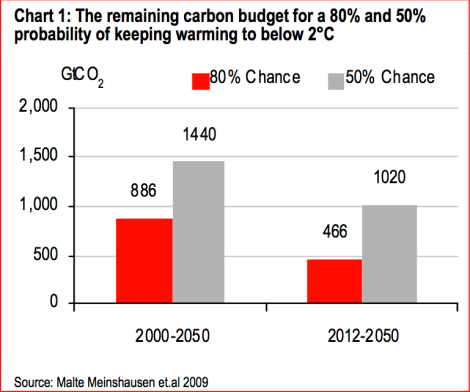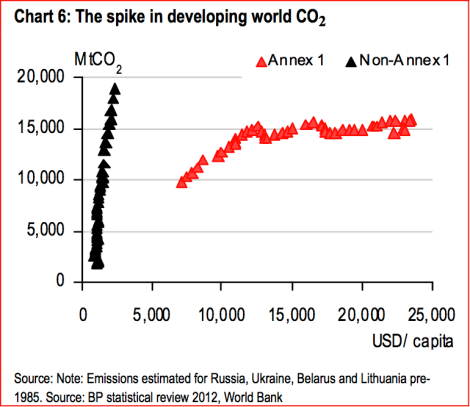London-based HSBC is a banking and financial services company, very old and very large — the sixth largest public company in the world. Greenpeace it ain’t. So it’s striking that the latest report from the financial giant sounds strikingly like the hippie alarmism of a Bill McKibben, a Joe Romm, or a … me. Then again, our hippie alarmism sounds a lot like the science surveys put out by the International Energy Agency, the World Bank, MIT, and the U.S. National Climate Assessment.
So I guess we’re all hippies now.
The report is called “Peak Planet” (you gotta pay for it, unfortunately — Giles Parkinson has a great write-up) and it’s about the threat of climate change and “the next upswing in the climate agenda.”
The broad story HSBC sketches is familiar. If we want to hold warming below 2 degrees Celsius over pre-industrial levels, there’s only so much carbon we can dump in the atmosphere. That’s our “carbon budget.” We can either budget for an 80 percent chance or a 50 percent chance of avoiding 2C (obviously the budget is bigger if the chances of success are reduced). Like so:
The difference between the bars on the left and the bars on the right shows that, between 2000 and 2012, we used up about 420 gigatons of our budget. At the rate we’re going, says HSBC, we’ll burn through the 80 percent budget by 2026 and the 50 percent budget by 2039. To avoid that unpleasant outcome, global carbon emissions need to peak soon — by 2020 at the latest, says HSBC — and begin declining rapidly.
Achieving that wildly ambitious aim would mean, as McKibben so well elucidated, leaving somewhere between 60 and 80 percent of current fossil fuel reserves in the ground. That’s about $27 trillion worth of value that must be set aside.
That fact is so stark, so absurd, that it has taken some time to sink in. But it’s happening. Earlier this year, investors worth $87 trillion demanded that companies begin disclosing their “carbon risk.” As HSBC puts it, “The contradiction between global carbon budgets and fossil fuel reserves is gaining increasing attention.”
Anyway, that grim story, and the enormous challenge it represents, is familiar enough. What HSBC brings to the table is a bit of guarded optimism: “This is a tough task — but not impossible in our view.” Not impossible, woo!
HSBC focuses on the Carbon Five — China, Russia, India, the E.U., and the U.S. — and says that they need to halve the carbon intensity of their economies by 2020. (Carbon intensity is the amount of CO2 emitted per unit of GDP.) This isn’t so hard to imagine. Energy demand and CO2 emissions have “naturally” peaked and begun declining in developed countries, without any climate policy at all. “For the emerging world,” HSBC notes with some understatement, “this is no longer an option.” Here’s why:
As you can see, per-capita income is rising slowly but CO2 emissions are rising quickly. At this rate, by the time per-capita income catches up to the developed world, we’ll all be living on a cinder. A bad situation.
Nonetheless, HSBC maintains a plucky optimism. It says that it can be done, thanks to a “bundle of drivers”:
- The impacts of climate change are becoming more obvious.
- Public opinion is changing, particularly in the U.S.
- The dependence of developing countries on fossil fuel imports is starting to hurt.
- Clean energy and efficiency technologies are getting cheaper.
- Climate policy, which has been stagnating since 2010, will be revived, thanks in part to a new round of IPCC reports.
Color me a bit skeptical about that last one, but … who knows? Maybe! I don’t know if HSBC’s optimism is warranted. But I do know this: The fact that the world’s big banks are paying serious attention to our carbon budget is a sign that the financiers of the world will not stay neutral in this fight forever. Fossil fuel companies are not the only big money around.





